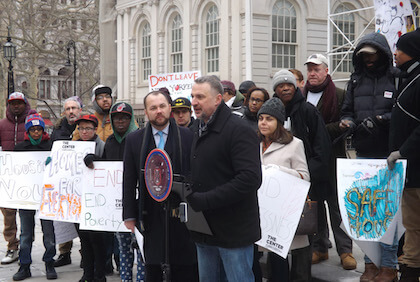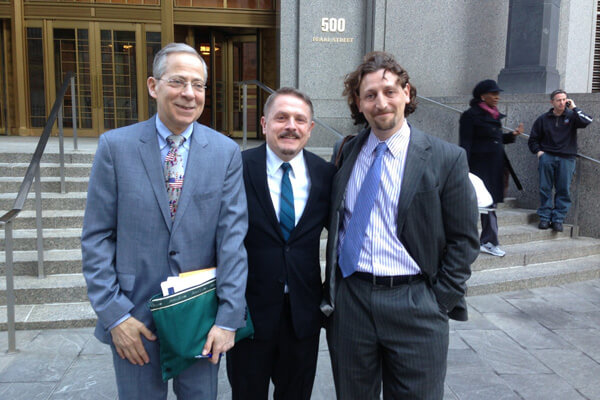What the mayor’s political flirtations really mean. | MICHAEL SHIREY
The prevailing City Hall narrative in New York — from early 2006 through late 2012 — pictured a happy, stable, and mutually advantageous political marriage between Mayor Michael Bloomberg and City Council Speaker Christine Quinn.
A frequent critic of Bloomberg in her previous role as former Speaker Gifford Miller’s number two, Quinn proved quickly — in the wake of her election to lead the Council in January 2006 — that she could play nice with the mayor. Even as her opponents, including some former allies, charged she was carrying water for Bloomberg, Quinn cast their relationship as a partnership that serves the citizens of New York.
In 2007, just 18 months into her tenure as speaker, she told Gay City News, “He’s the mayor. I’m the speaker of the City Council. We have an obligation to get as much done as we can to help New Yorkers, right? Nobody wants to hear from us in 2009 that, ‘Oh, he was difficult,” and ‘She was a bitch.’”
What the mayor’s political flirtations really mean
Mayor Michael Bloomberg. | GAY CITY NEWS
The partnership was cemented in the fall of 2008, when the speaker led the Council in approving a waiver on term limits, allowing Bloomberg to run for a third term. Quinn endured intense criticism for her role in that — with anger in her district helping to fuel a stronger than expected primary challenge for her own seat — but the four-year extension allowed her to put space between embarrassing revelations in early 2008 about an appropriations slush fund managed for years out of the speaker’s office and her own eventual run for mayor.
The political world assumed that after granting Bloomberg the right to a third term, Quinn would enjoy the mayor’s support — in one form or another — in her race to succeed him.
Three stories published in the New York Times over the past six weeks, however, strongly hint Bloomberg may be experiencing something of a seven-year itch. About a year ago, the mayor reached out to Secretary of State Hillary Clinton, encouraging her to enter the race, the newspaper reported, citing the accounts of three people told of those discussions.
To be sure, only Barack Obama has managed to prove he will not stand for being second choice after Hillary Clinton, so there may be no shame for Quinn in having the mayor dream his successor could be just that famous. The other names the Times has linked to Bloomberg’s calculations are Senator Chuck Schumer, the only other political pro in the bullpen, Mort Zuckerman, the billionaire owner of the Daily News, Ed Skyler, the mayor’s former top deputy, and Ed Rendell. As in the former mayor of Philadelphia and former governor of Pennsylvania.
That would seem a good bit of casting about for alternatives from a man long expected to help Quinn’s career along. It’s far from clear what concrete steps, if any, Bloomberg took to encourage any of these names to step up. The approach to Rendell, for example, was made by Bradley Tusk, who, though he ran the mayor’s 2009 campaign, told the Times the conversations came at the behest of “a few people in the business community.” Tusk, it should be noted, has acknowledged he offers periodic “informal” advice to Quinn.
Still, it seems clear, at the very least, that the mayor has been indiscreet in letting it be known he isn’t yet in a place where he can comfortably imagine any one person occupying the seat he’s held for nearly a dozen years.
What’s that all about?
City Council Speaker Christine Quinn. | DONNA ACETO
While some pundits have concluded Quinn has been played by the mayor, half a dozen people Gay City News spoke to, from the LGBT leadership, political consulting, and academic worlds, are not convinced it means what it would appear to — and not, in fact, the exact opposite.
“It helps her, obviously, to get some distance from the mayor,” said George Arzt, a former journalist and press secretary to Mayor Ed Koch who has run his own communications and government relations firm since 1995.
At the same time, Quinn continues “getting his institutional support,” emphasized Arzt, citing Tusk’s engagement with the speaker’s campaign as well as the more formal role played by Josh Isay, a managing director at the communications consulting firm of SKDKnickerbocker who also worked on Bloomberg’s 2009 reelection effort.
Pointing to the dissatisfaction Quinn often hears from progressive constituencies about her closeness to the mayor, Arzt said, “If she can say, ‘Have you been reading the newspapers?’ while clearly getting his support, she can bake the cake and eat it, too.”
Arzt, however, did not argue that stories like those in the Times mean nothing, nor did he make the case that it was all a feint on the mayor’s part to give Quinn politically helpful room to maneuver.
“It leads to a lot of head scratching,” he acknowledged, before suggesting the stories say a lot more about Bloomberg than they do about Quinn.
Noting that the day after the Times story about the Clinton overture appeared in early December Bloomberg made a point of publicly praising the speaker, Arzt said, “The mayor is not really a political person. His instincts shift from day to day. There is not a real formula that explains what Bloomberg does. If this were someone in mainstream politics, you could predict the moves, but not here. He’s a person who makes the rules, he doesn’t follows them.”
“There is not a real formula that explains what Bloomberg does. If this were someone in mainstream politics, you could predict the moves, but not here.” –– George Arzt
Ken Sherrill, an out gay professor emeritus of political science at Hunter College, agreed that Bloomberg’s wandering eye need not hurt Quinn — at least in her face-off against other Democrats — and that the spate of recent stories are interesting mostly for the insights they provide about the mayor himself.
“I don’t think that being supported by the mayor helps any candidate among likely voters in a Democratic mayoral primary,” he said, before adding, about Bloomberg’s public ruminating, “I don’t think it’s lack of confidence in Chris. Rather, it involves Bloomberg’s self-image as a superstar, superhero. And he thinks that the city needs someone like himself, not someone who has made a career in New York City politics. If it has to be a career New York City politician, he prefers Chris to the others.”
The mayor’s thinking, in Sherrill’s view, is not all based in preening self-regard.
“One of Bloomberg’s strengths, relative to any recent mayor, is that he has really thought about the city in long-term ways,” Sherrill argued, noting his efforts on the budget, public health, and environmental issues. “Twenty-five to 50 years from now, that’s what his mayoralty may be most remembered for. His ideal mayor is someone who’s going to think about the city 50 or 100 years from now, not today. I think that’s why you see him looking for people who aren’t New York City politicians.”
In flirting with other names, then, the mayor is rejecting the entire political class.
“He can barely contain his disdain,” Sherrill said. “With friends, he can no longer keep back his feeling that the city deserves something much better than what the New York political system can produce.”
Others see more coordinated choreography behind the recent Times stories.
“I can only speculate on what Mayor Bloomberg might be thinking,” Matt McMorrow, a co-president of Brooklyn’s Lambda Independent Democrats, wrote in an email message. “But I wouldn’t be surprised if it is a deliberate attempt to distance himself from Christine Quinn, probably to her benefit.”
McMorrow suspects the speaker’s moves may soon mirror Bloomberg’s.
“As the primary season picks up and she tries to court registered Democrats, I think you will see Quinn drawing greater distinctions between herself and the mayor, which I think is a smart strategy,” he wrote.
Another longtime Lambda member, Alan Fleishman, a former Democratic district leader in Park Slope, takes what he acknowledged is a more “cynical” view of what’s going on.
“I’m just naturally very suspicious of things like this,” he said. “It almost looks like this is orchestrated.”
Referring to Bloomberg’s deputy mayor, Fleishman said, “Look at Howard Wolfson, the king of spin. He keeps the mayor’s name out there. And it kind of helps Chris. Everywhere she goes in the progressive community, they tell her they don’t like the mayor. I wish I wasn’t so cynical, but I am sure that Josh Isay and Wolfson talk every day.”
Asked whether he or others in the Quinn campaign team had spoken to the mayor’s inner circle about the Times stories, Isay said, “I’m not going to comment on personal conversations.” Asked if the stories worried him, he would say only, “No.”
“I wish I wasn’t so cynical, but I am sure that Josh Isay and Howard Wolfson talk every day.” –– Alan Fleishman
Melissa Sklarz, president of the Stonewall Democratic Club of New York City, took the occasion of being asked about the mayor’s deliberations to take a few pokes at him — in the process, pointing up the baggage Quinn could being trying to shed.
“It appears that Mayor Bloomberg is uncomfortable with all New Yorkers having an equal say as to who our political leader should be,” she said, in an email message. “He has shown little patience for the political process nor much respect for those that practice it as a career. I am sure he has asked all of his other billionaire, media friends, and perhaps he is down to his millionaire friends.”
Even if everyone agrees that there are political benefits to Quinn staking out a more independent profile from the mayor, Arzt argued that recent speculation about Bloomberg’s loyalty has not come without costs.
“Where it hurts Quinn is with the establishment, who might have said, ‘If the mayor supports her, I will,’” he said. “Those people are now free to go with someone else.”
Asked whether he saw the speaker’s resistance to a paid sick leave bill that would cover most private sector employers as a bid for that crowd's affections, Arzt said, “She has to solidify her position with the establishment. She’s on a tight rope. She has to protect herself on the left, but must show bona fides with the establishment.”
Sherrill, however, felt Bloomberg has little to offer Quinn politically. Newspaper editorial boards, he said, will prefer her to other Democrats, such as Public Advocate Bill de Blasio and former Comptroller William C. Thompson, who have tacked to the left of Quinn. Since she is participating in the city’s generous campaign finance program, the speaker also does not need the mayor’s help in raising money. (Quinn has pulled in $6.2 million, to date, versus $3.5 million for de Blasio, her nearest rival, though the public advocate did out-raise her by nearly $300,000 in the six months that ended last week.)
Despite her lead in early fundraising and opinion polls, Arzt is not convinced Quinn is a shoo-in for the Democratic nomination. He said either de Blasio or Thompson, who he said is the only candidate with a built-in base — the 25 percent or so of primary voters who are African-American — could win, as well.
And with the recent signs Joe Lhota — who ran the Metropolitan Transportation Authority for the past year and served former Mayor Rudy Giuliani as a top deputy — will wage a campaign on the Republican side, Arzt added that the general election may “not be a walk in the park.”
“Lhota is a very strong candidate who the establishment feels can run the city,” he said.
Then again, Lhota’s standing with the mayor was certainly hurt when the MTA chair publicly called him “an idiot” for his predictions of when the Midtown Tunnel would open in the wake of Superstorm Sandy. Should the fall campaign pit Quinn against Lhota, that might be the moment when where the mayor stands becomes truly pivotal.




















